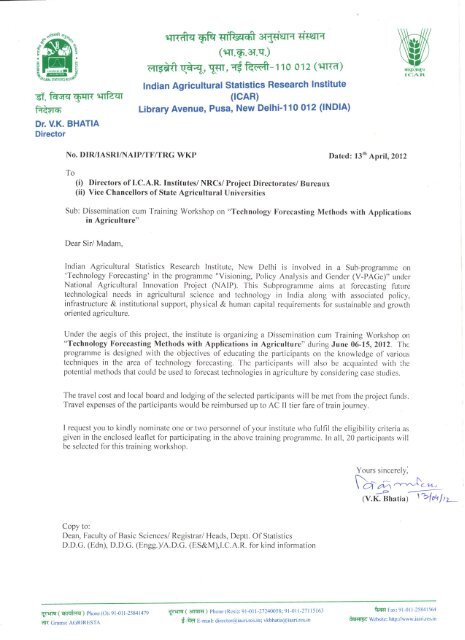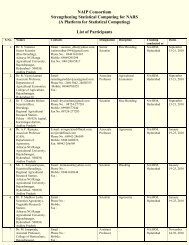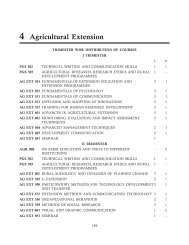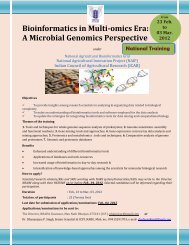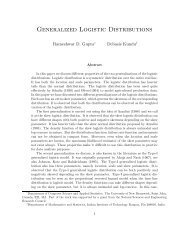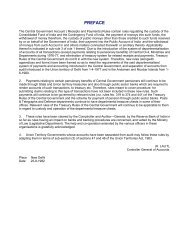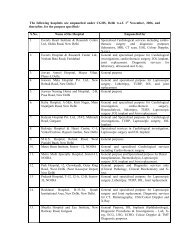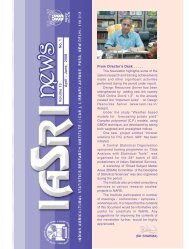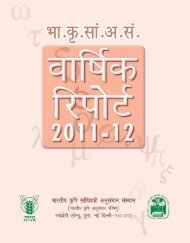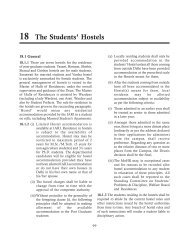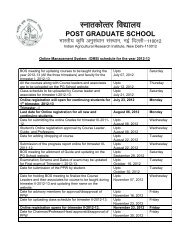Application form for Admission to Training Programme - IASRI
Application form for Admission to Training Programme - IASRI
Application form for Admission to Training Programme - IASRI
You also want an ePaper? Increase the reach of your titles
YUMPU automatically turns print PDFs into web optimized ePapers that Google loves.
<strong>Application</strong> <strong><strong>for</strong>m</strong> <strong>for</strong> <strong>Admission</strong> <strong>to</strong> <strong>Training</strong> <strong>Programme</strong> on “Technology<br />
Forecasting Methods with <strong>Application</strong>s in Agriculture”<br />
(06 - 15 June, 2012)<br />
1. Full Name (Capital Letters):<br />
2. Designation:<br />
3. Gender (Male/Female):<br />
4. Date of Birth:<br />
5. Present Employer’s Address:<br />
6. Address <strong>for</strong> correspondence:<br />
7. Telephone Number (O)/(R):<br />
E-mail address/Fax No. :<br />
8. Teaching/Research/ Professional experience and number of<br />
publications:<br />
9. Educational Qualifications:<br />
10. Level of Knowledge of Statistics:<br />
11. Total length of service:<br />
12. Participation in Seminars, training programmes (details) during past<br />
one year:<br />
13. Basic Pay (Rs.):<br />
Signature of the Applicant with date<br />
It is certified that in<strong><strong>for</strong>m</strong>ation furnished above is correct.<br />
ANNOUNCEMENT<br />
Dissemination cum <strong>Training</strong> Workshop<br />
on<br />
“Technology Forecasting Methods<br />
with <strong>Application</strong>s in Agriculture”<br />
Under<br />
Sub-programme on<br />
Technology Forecasting in the<br />
NAIP <strong>Programme</strong><br />
Visioning, Policy Analysis and Gender (V-PAGe)<br />
06 - 15 June, 2012<br />
Name, Designation and Address of<br />
Recommending Authority:<br />
Signature:<br />
(of recommending authority with date along with seal)<br />
Please send your application in the above <strong><strong>for</strong>m</strong>at <strong>to</strong> any one of the following:<br />
(i) Direc<strong>to</strong>r, <strong>IASRI</strong>, Library Avenue, New Delhi-110012; E-mail:<br />
vkbhatia@iasri.res.in Tele: 011-25841479; Fax: 011-25841564;<br />
GRAM:AGRIRESTA<br />
(ii) Dr. Ramasubramanian V., Course Direc<strong>to</strong>r & Senior Scientist<br />
(Agricultural Statistics), Division of Biometrics & Statistical<br />
Modelling, <strong>IASRI</strong>, Library Avenue, New Delhi – 110 012; email:<br />
ram.vaidhyanathan@gmail.com<br />
(iii) Mr. Amrender Kumar, Course Co-Direc<strong>to</strong>r & Scientist<br />
(Agricultural Statistics), Division of Forecasting and Econometrics<br />
Techniques, <strong>IASRI</strong>, Library Avenue, New Delhi – 110 012; email:<br />
akjha@iasri.res.in<br />
Course Direc<strong>to</strong>r: Dr. Ramasubramanian V.<br />
Course Co-Direc<strong>to</strong>r: Mr. Amrender Kumar<br />
VENUE: <strong>IASRI</strong>, NEW DELHI<br />
INDIAN AGRICULTURAL STATISTICS RESEARCH INSTITUTE<br />
(I.C.A.R)<br />
LIBRARY AVENUE, PUSA, NEW DELHI -110 012
BACKGROUND<br />
Indian agriculture in future is likely <strong>to</strong> be much different from what it is<br />
now. New upcoming technologies are expected <strong>to</strong> be different from<br />
what these are now. Thus there is a constant need <strong>for</strong> <strong>for</strong>ecasting and<br />
assessment of future technological needs of agricultural sec<strong>to</strong>r <strong>to</strong> fill<br />
the gaps in the present technological trends in order <strong>to</strong> have innovative<br />
policies, technologies and opportunities <strong>for</strong> holistic and sustainable<br />
development. It is there<strong>for</strong>e imperative <strong>to</strong> articulate technological needs<br />
of different segments of agriculture and contemplate how developments<br />
in science can help address these needs.<br />
Technology Forecasting (TF), in general, applies <strong>to</strong> all purposeful and<br />
systematic attempts <strong>for</strong> anticipating and understanding the potential<br />
direction, rate, characteristics, and effects of feasible and/or desirable<br />
characteristics of per<strong><strong>for</strong>m</strong>ance parameters of future technologies such<br />
as machines, procedures or techniques. Thus TF is the qualitative as<br />
well as quantitative prediction at stated level of confidence of these<br />
technologies with a specific time frame and specified level of support<br />
such as policy, capital, human resource and infrastructural needs. TF is<br />
required <strong>for</strong> better planning and future preparedness, enlarging the<br />
choice of opportunities, setting priorities and assessing impact. It may<br />
also give strategic advantage and global competitiveness in R&D. The<br />
most commonly used TF techniques range from intuitive methods (e.g.<br />
Delphi, brains<strong>to</strong>rming, scenario building, cross impact analysis, etc.) <strong>to</strong><br />
statistical methods (e.g. trend extrapolation, substitution models,<br />
growth models, etc.) <strong>to</strong> normative methods (e.g. morphological<br />
analysis, relevance trees etc.) <strong>to</strong> moni<strong>to</strong>ring methods (e.g. bibliometric/<br />
scien<strong>to</strong>metric/ patent analyses).<br />
OBJECTIVES:<br />
The proposed Dissemination cum <strong>Training</strong> Workshop aims at<br />
1. Educating the participants about the various existing and advanced<br />
techniques in the area of technology <strong>for</strong>ecasting<br />
2. Acquainting the participants with practical exposure and learning<br />
on the potential methods that could be used <strong>to</strong> <strong>for</strong>ecast<br />
technologies in agriculture by considering some case studies<br />
TRAINING WORKSHOP CONTENTS:<br />
The training workshop has been structured <strong>to</strong> be covered in eight<br />
working days with classroom lectures and demonstrations on<br />
applications of technology <strong>for</strong>ecasting methodologies. <strong>Training</strong><br />
material will be provided <strong>to</strong> all the participants. The <strong>to</strong>pics <strong>to</strong> be<br />
covered are:<br />
1. Introduction <strong>to</strong> Technology Forecasting (TF) and assessment<br />
methods<br />
2. Brains<strong>to</strong>rming, Delphi, and other explora<strong>to</strong>ry methods<br />
3. Cross-impact analysis and its variants<br />
4. Visioning and Strategic planning<br />
5. Policy analysis and Impact assessment<br />
6. Morphological analysis, Relevance trees and other normative<br />
methods<br />
7. Scien<strong>to</strong>metrics, Patent analysis and other moni<strong>to</strong>ring methods<br />
8. Multi-Dimensional Scaling (MDS) and other multivariate methods<br />
9. Analytic Hierarchy Process (AHP) and its improvements<br />
10. Goal-Objective-Strategy tree approach <strong>for</strong> TF<br />
11. Time series, substitution /diffusion models and other extrapolation<br />
methods<br />
12. Framework Forecasting and other conceptual <strong>for</strong>ecasting methods<br />
13. Systems Dynamics models<br />
14. TF initiatives at <strong>IASRI</strong><br />
ELIGIBILITY<br />
The candidate must possess Master’s degree in any discipline of<br />
Agricultural Sciences or allied fields. They should be working in ICAR<br />
Institutes/NRCs/State Agricultural Universities etc. preferably in a<br />
position not below the rank of Assistant Professor/Scientist.<br />
GENERAL INFORMATION<br />
The participants will be paid <strong>to</strong> and fro travel fare <strong>for</strong> the journey by<br />
train as per their entitlement <strong>for</strong> the class of travel restricted, however,<br />
<strong>to</strong> the maximum of AC-II Tier fare only (excluding Rajdhani and<br />
Shatabdi) or bus or any other means of transport in vogue as the case<br />
may be, if the same is not borne by the sponsoring organizations.<br />
Free boarding and lodging will be provided <strong>to</strong> participants during<br />
the training workshop as per ICAR guidelines on Short Course.<br />
The participants are advised not <strong>to</strong> bring family members with them.<br />
The number of participants admitted <strong>to</strong> the programme will be 20. Last<br />
date of receipt of applications has been extended <strong>to</strong> May 21, 2012.


